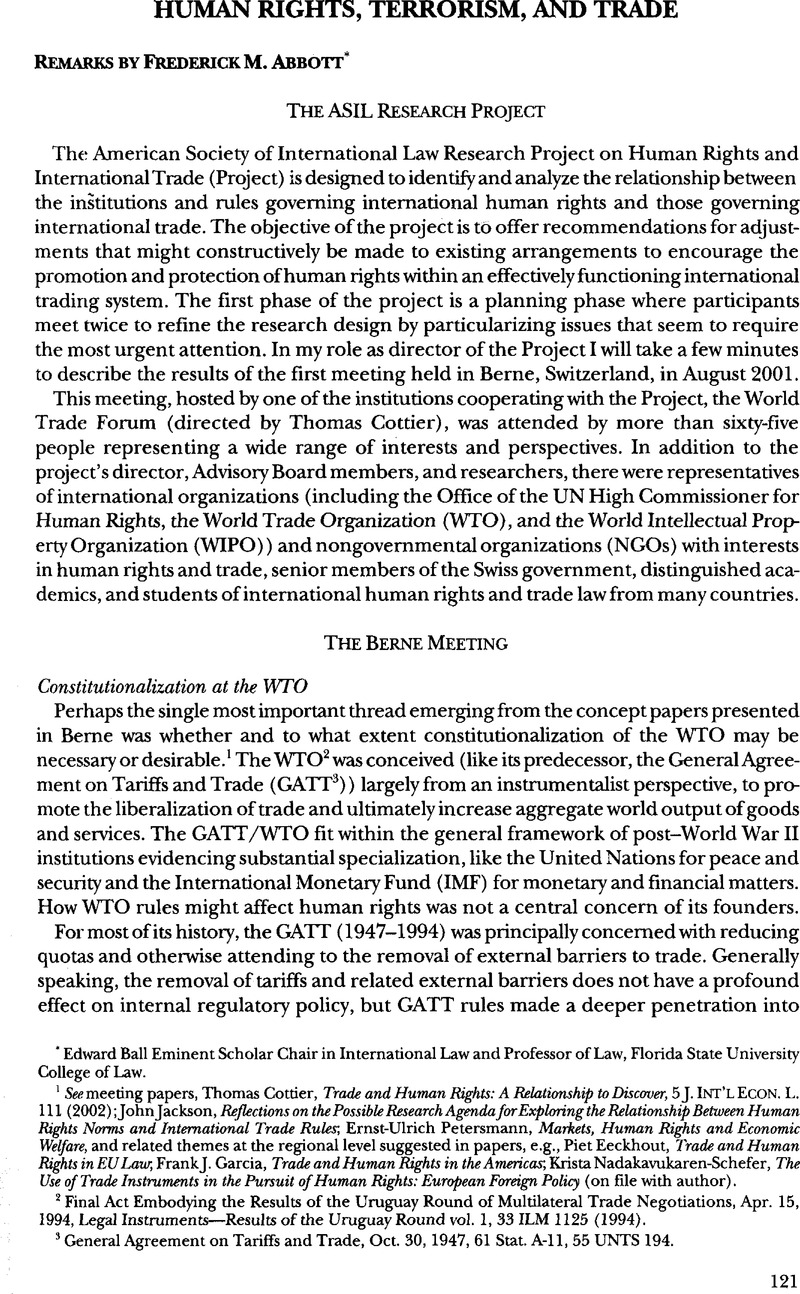No CrossRef data available.
Article contents
Remarks by Frederick M. Abbott
Published online by Cambridge University Press: 28 February 2017
Abstract

- Type
- Human Rights, Terrorism, and Trade
- Information
- Copyright
- Copyright © American Society of International Law 2002
References
1 See meeting papers, Cottier, Thomas, Trade and Human Rights: A Relationship to Discover, 5 J. Int’l Econ. L. 111 (2002)CrossRefGoogle Scholar; John Jackson, Reflections on the Possible Research Agend a for Exploring the Relationship Between Human Rights Norms and International Trade Rules; Ernst-Ulrich Petersmann, Markets, Human Rights and Economic Welfare, and related themes at the regional level suggested in papers, e.g., Piet Eeckhout, Trade and Human Rights in EU Law, Frank J. Garcia, Trade and Human Rights in the Americas; Krista Nadakavukaren-Schefer, The Use of Trade Instruments in the Pursuit of Human Rights: European Foreign Policy (on file with author).
2 Final Act Embodying the Results of the Uruguay Round of Multilateral Trade Negotiations, Apr. 15, 1994, Legal Instruments—Results of the Uruguay Round vol. 1, 33 ILM 1125 (1994).
3 General Agreement on Tariffs and Trade, Oct. 30, 1947, 61 Stat. A-ll, 55 UNTS 194.
4 See John Hart Ely, Democracy and Distrust: A Theory of Judicial Review (1980).
5 This discussion centered on the paper by Gabrielle Marceau, The WTO Dispute Settlement Procedures and Human Rights (meeting paper, Dec. 19, 2001) (on file with author).
6 See, e.g., Petersmann, supra note 1; Marceau, id..
7 See Frederick M. Abbott, Compulsory Licensing f or Public Health Needs: The Trips Agenda at the WTO after the Doha Declaration on Public Health, Occasional Paper 9 (Quaker United Nations office: Geneva, Feb. 2002).
8 See Questions of Interpretation and Application of the 1971 Montreal Convention Arising From the Aerial Incident at Lockerbie (Libyan Arab Jamahiriya v. U.S.), Provisional Measures, 1992 ICJ Rep. 114 (April 14) (including separate opinions expressing views on juridical relationship between UN Security Council and International Court of Justice) (considering, but not resolving, the analogy to the relationship between the International Court of Justice and UN Security Council), available at <http://www.icj-cij.org>.
9 International Covenant on Economic, Social and Cultural Rights, Dec. 19, 1996, 993 UNTS 3.
10 See Alan O. Sykes, International Trade and Human Rights: An Economic Perspective, Address at Planning Meeting, ASIL Research Project on Human Rights and International Trade (July 27, 2001).
11 Professor Sykes notes that his preliminary data do not address causality.
12 This is not intended to ignore the presence of strongly held “anti-WTO” views among at least a fringe of certain NGOs..
15 Agreement on Trade-Related Aspects of Intellectual Property Rights, Apr. 15, 1994, Marrakesh Agreement Establishing the World Trade Organization, Annex 1C, Legal Instruments—Results of the Uruguay Round vol. 31, 33 ILM 81 (1994).
14 See Frederick M. Abbott, TRIPS and Human Rights: Preliminary Reflections; Edward Kwakwa, Intellectual Property and Human Rights; Simon Walker, TRIPS, the World Health Organization, the World Intellectual Property Organization, and the Food and Agriculture Organization: The Human Rights Angle (meeting papers, on file with author).
15 See, The Impact of the Agreement on Trade-Related Aspects of Intellectual Property Rights on Human Rights, UN Economic and Social Council, UN Doc. E/CN.4/Sub.2/2001/13 (2001).
16 World Trade Organization, Dedaration on the Trips Agreement and Public Health, WT/MIN(01)DEC/W/2, Doc. No. 01-570 (2001). See, e.g., Abbott, Frederick M., The Doha Declaration on the Trips Agreement and Public Health: Lighting a Dark Corner at the WTO, 5 J. Int’l Econ. L. 469 (2002)CrossRefGoogle Scholar.
17 The recitals to the September 19, 2001, draft stated:
Discharging the obligation to protect and promote the fundamental human rights to life and the enjoyment of the highest attainable standard of physical and mental health, including the prevention, treatment and control of epidemic, endemic, occupational and other diseases and the creation of conditions which would assure to all medical service and medical attention in the event of sickness, as affirmed in the International Covenant on Economic, Social and Cultural Rights . . .
Proposal by die African Group, Bangladesh, Barbados, Bolivia, Brazil, Cuba, Dominican Republic, Ecuador, Haiti, Honduras, India, Indonesia, Jamaica, Pakistan, Paraguay, Philippines, Peru, Sri Lanka, Thailand and Venezuela, draft Ministerial Declaration on the Trips Agreement and Public Health, Council for Trips, IP/C/W/312, WT/GC/W/450, Oct. 4, 2001, available at <http://www.wto.org>.




